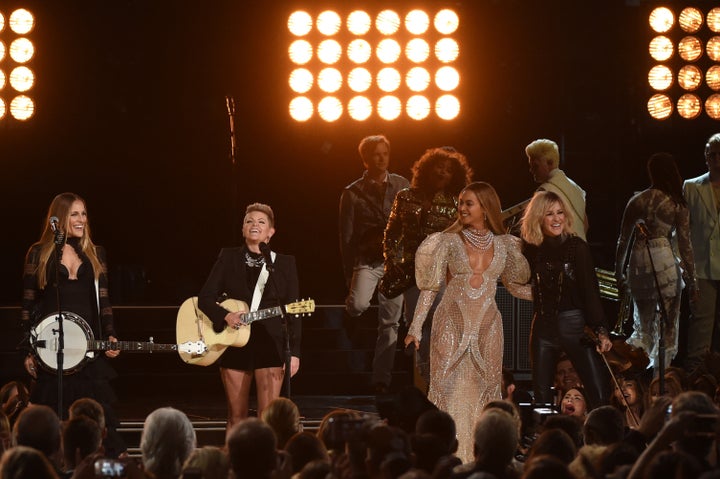According to Megyn Kelly, Beyoncé hasn’t faced much backlash for releasing country music… even though a quick Google search will tell you otherwise.
During a segment of “The Megyn Kelly Show” posted online Thursday, the former Fox News host complained to guest Glenn Greenwald that Beyoncé’s current world tour features an onstage clip of Kelly criticizing the marketing behind the singer’s 2024 country album, “Cowboy Carter.”
Kelly was not pleased and accused Beyoncé of playing “the victim,” suggesting that the singer is exaggerating the hostility she’s faced for putting out country music.
“The vast majority of consumers and her fans celebrated her to high heaven,” Kelly said, before later claiming “[Beyoncé] had to scour the internet to find anybody who offered any criticism of this move whatsoever.”
But googling any combination of the words “Beyoncé,” “criticism,” and “country music” will generate several news articles highlighting the singer’s turbulent experience in the country music world, including the hostility she faced after releasing the 2016 song “Daddy Lessons” on the album “Lemonade.”
When Beyoncé, a Houston native, performed the song alongside The Chicks at the 2016 Country Music Association Awards, their performance was met with swift backlash and a wave of racist attacks from country music fans online.
“Having Beyoncé perform at the CMA Awards is like having Taylor Swift perform at the BET Awards,” one person wrote on X, formerly Twitter, at the time.
Beyoncé “isn’t even what country represents,” wrote another, per The New York Times.
Natalie Maines, lead singer of The Chicks, told Howard Stern in 2020 that there was a “weird vibe in the building” the night she performed with Beyoncé, and said that furious “racist assholes” emailed the CMAs and bombarded the social channels for the CMA Awards in response to the singer’s performance.
Rick Diamond via Getty Images
Beyoncé shared on Instagram in March last year that her “Cowboy Carter” album was born out of “an experience” in which she “did not feel welcomed.” While she did not explicitly mention the CMA Awards, it’s widely understood that she was alluding to the polarizing 2016 performance.
“The criticisms I faced when I first entered this genre forced me to propel past the limitations that were put on me,” she wrote at the time.
Beyoncé has since made history in the country music industry, which has a history of racism and discrimination despite country’s Black roots. Last year, she became the first Black woman to top Billboard’s country music chart with the song “Texas Hold ’Em.”
Even so, “Cowboy Carter” was controversially shut out of last year’s CMA Awards nominations.
Monica Cwynar, a licensed clinical social worker with Thriveworks who specializes in trauma and coping skills, said that “the backlash Beyoncé has received for exploring country music can be viewed as a reflection of deep-rooted biases in the music industry and society at large.”
“People like to put individuals in boxes that make them comfortable. When she chose to explore a genre that has been dominated by white performers, some people may feel threatened or angry, as if she doesn’t have a right to be in this space,” Cwynar said. “As an artist from Texas, she has the cultural backdrop to authentically engage with country music.”
“Music should bring us together,” she added. “Her decision to continue releasing country music despite pushback highlights her commitment to artistic expression and authenticity, serving as an important statement about inclusivity in music.”
Stating your experience with racism and discrimination doesn’t mean you’re “playing the victim.”
Cwynar said that Kelly’s remarks about Beyoncé dismiss the criticism and discrimination the singer faces, and that the former Fox News host is speaking to her “own personal bias.”
“This perspective reinforces a narrative that often seeks to silence Black voices and experiences, suggesting that there is a right way for Black artists to navigate their careers,” she said.
Cwynar said that Kelly’s suggestion that Beyoncé didn’t face significant criticism entering the country music world could be seen as a form of gaslighting.
“By suggesting that Beyoncé’s experiences with criticism are nonexistent or exaggerated, it attempts to undermine her lived reality and negate her perspective,” she said. “This diminishes the authenticity of her experiences and can lead to greater feelings of isolation and confusion for those who may relate to her struggles.”
Being gaslit about experiencing racism can have “profound effects on mental health” for anyone.
“I have seen this in my practice; it leads to increased feelings of self-doubt, anxiety and depression, as individuals may begin to question their perceptions of reality,” Cwynar said. “It can also exacerbate feelings of isolation, as victims might feel unsupported in their struggles.”
“Validating one’s experiences and seeking community support can be essential to counteracting these effects,” she added.
And for anyone who feels that the validity of their experiences with racism and discrimination are being questioned, Cwynar recommends that you find supportive spaces and communities where your feelings can be validated.
“Journaling their experiences can help clarify their thoughts and feelings,” she said.
“Ultimately, these conversations highlight the ongoing need for open dialogue about race, identity, and the intersections within the music industry and beyond,” she added. “We have come a long way but we have to still continue to move forward with patience and making space for everyone.”
Content shared from www.huffpost.com.

